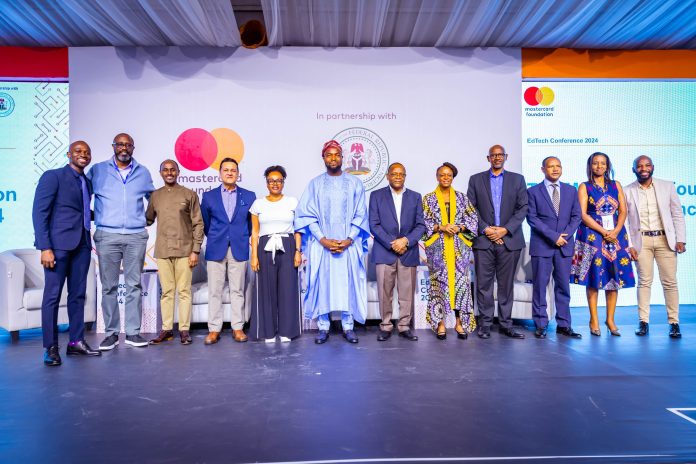About 600 stakeholders from over 30 countries in Africa and beyond came together from July 8 to 10 at the inaugural Mastercard Foundation (https://MastercardFdn.org/) EdTech Conference in Abuja, Nigeria, to discuss education technology for resilient and inclusive learning in Africa. Participants reached a consensus that integrating technology into learning systems in Africa is now a necessity, not a luxury.
Hosted in partnership with the Federal Government of Nigeria, the conference concluded with a collective call to action on 10 recommendations for governments and other EdTech stakeholders.
“Investing in education in Africa is not only about Africa; rather, it is about investing in human capital for the world. It is also about building resilience in our learning systems to better prepare us for future shocks such as the recent COVID-19 pandemic. This is why the Mastercard Foundation is committed to working with partners to scale education initiatives and enable innovations that foster the integration of technology into learning systems,” Peter Materu, Chief Program Officer at the Mastercard Foundation, told participants while underscoring education as the key to building an inclusive and resilient society and the urgent need for investments in education to skill Africa’s young people.
Nigeria’s Federal Minister of Education, Prof. Tahir Mamman, stated, “technology isn’t just a tool; it is a powerful incentive that empowers students and ignites their passion for learning.”
“Inclusion is the cornerstone of EdTech,” added Dr. Bosun Tijani, Nigeria’s Federal Minister of Communications, Innovation and Digital Economy. “If we fail to reach all learners, we fail to fulfill our potential to revolutionize education.”
Participants proposed the following recommendations as guidance to national decision-making to advance the building of an impactful EdTech ecosystem in Africa.
- Champion local innovation through supportive EdTech policies, with governments as leaders, proactive enablers, and consumers of quality content and delivery mechanisms.
- Harmonize cross-sector policy by coordinating inter-ministerial strategies, plans, and initiatives on technology-enabled access to education for all.
- Underwrite foundational infrastructure through creative use of resources such as Universal Service Funds to invest in electricity, the internet, devices, and dedicated infrastructure for education programs.
- Drive decisions with data by investing in government systems and capabilities for timely collection, analysis, and informed decision-making.
- Enhance delivery capacity along the EdTech value chain by upskilling teachers to deliver learning using EdTech and supporting leaders in education systems to work with tech-enabled processes and data.
- Systematize EdTech integration by introducing (where nonexistent) and enforcing clear, context-relevant standards for technology integration into the educational curriculum.
- Guide context-relevant innovation with clear and timely guidelines and approval processes for content, tools, and licenses to encourage innovation, investment, and technology mainstreaming.
- Diversify learning pathways for out-of-school youth by developing flexible technology- enabled alternatives for learning, accredited certification, and re-entry to the formal education system.
- Lower access barriers to EdTech through strategic private-public partnerships that support responsive, evidence-based policy and affordable solutions for all.
- Embed responsive inclusivity (gender equity, persons with disabilities and refugees and displaced persons) in policy and innovation processes, centering and engaging diverse young people throughout development and delivery.
Referencing the African Union’s 2024 Year of Education, discussions at the conference focused on the state of EdTech in Africa, assessment of technology-enabled solutions to the continent’s education challenges, data evidence, collaborations, funding, and opportunities to tap into emerging technologies to accelerate the skilling of young people, particularly young women.
Dr. Jamila Bio Ibrahim, Nigeria’s Federal Minister of Youth Development, emphasized the need to prioritize inclusiveness in education reform. “All voices, especially voices of young women, need to be included in the formulation of policies for them to be effective,” she noted.
The African Union’s Special Youth Envoy, Chido Mpemba, noted that “accessible innovations can be global in outlook while also being deeply rooted in the needs of Africa’s young population.”
African-led EdTech entrepreneurs exhibited their solutions at the conference to demonstrate how efforts to encourage impactful education innovation can deliver the future of learning.
The recommendations from the conference were shared at the 3rd Ministerial Forum on EdTech in Africa, which took place at the conclusion of the conference. Three of the recommendations were prioritized for concrete action between now and the next Forum:
- Developing strategies and policies to integrate EdTech into learning systems.
- The need to enhance quality education data and accompanying analytical skills for evidence-based decision-making.
- Addressing the challenge of out-of-school children and youth in Africa, which currently stands at 108m and is growing.
Through its Centre for Innovative Teaching and Learning, the Mastercard Foundation strategically partners to foster innovation, share best practices, conduct research, and convene events such as the EdTech Conference to advance inclusive education, especially for underserved learners. Speaking about the recently concluded conference in Abuja, Joseph Nsengimana, the Director of the Mastercard Foundation Centre for Innovative Teaching and Learning, said, “The collective commitment to advancing education through the power of technology promises to significantly transform the educational landscape, ensuring that Africa’s youth are well-equipped for the future.”
The next EdTech Conference is planned for 2026, the year the Mastercard Foundation marks its 20th anniversary.




